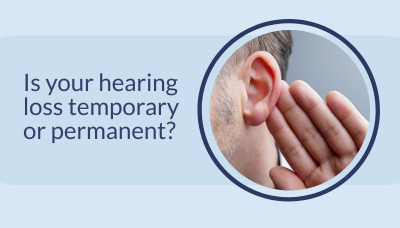|
www.HealthyHearing.com |
Is your hearing loss temporary or permanent?
Contributed by Joy Victory, managing editor, Healthy Hearing Have you noticed you're not hearing as well as you normally do? There are many causes of hearing loss, from age-related hearing loss to viral infections like mumps. 
Depending on the cause, your hearing loss may be temporary or permanent. Sudden hearing loss? Take actionIf you've developed rapid and sudden hearing loss in one or both ears—and you can't rule out any obvious causes listed below—get medical help right away. You may have harmful inflammation that can be treated aggressively with steroids. Without treatment, this hearing loss can become permanent. Do you need to see a doctor right away?Here's a checklist to help you know if you should seek prompt medical treatment (but always contact your medical provider for guidance):
If you answered no to all of these questions, it could be sudden sensorineural hearing loss, which requires prompt medical care. Common causes of temporary hearing lossMost temporary hearing loss doesn't start abruptly, but rather gradually over a few days or weeks before it becomes noticeable. Temporary hearing loss may be the result of an obstruction in your ear canal or a similar heath-related condition. Causes may include: Ear infectionSometimes a bad cold can develop into an ear infection, which can muffle hearing. Although this condition is most common in children, it can occur at any age. And while ear infections typically clear up by themselves, it’s always a good idea to see your doctor just in case yours needs to be treated with an antibiotic. Excessive earwaxThe hair follicles and glands in your inner ear produce cerumen, a substance also known as earwax. Although this wax usually falls out of your ears naturally or with a gentle washing, it sometimes builds up and blocks the ear canal. When this happens, you may feel a sensation that the ear is plugged, hear “ringing” in your ear (also known as tinnitus), or experience some hearing loss. If the wax can’t be removed by gently cleaning with a warm wash cloth, consult your physician. Trying to remove the wax with sharp objects, such as hair pins or cotton swabs, may push it deeper into your ear canal and perforate your ear drum. Strenuous exercise or stressCould your exercise routine be causing hearing loss or tinnitus? In a word, yes. When you exercise beyond your fitness level, you may experience temporary hearing loss. While hearing typically returns to normal in a few hours, see your doctor if the symptoms persist. Extreme stress can also trigger hearing problems or tinnitus. Loud noiseIt’s also common to temporarily lose your hearing or experience tinnitus after you’ve been exposed to loud noise, such as at a rock concert or while operating noisy lawn equipment. This is known as noise-induced hearing loss. While your hearing will most likely return to normal afterward, protect yourself by wearing foam ear plugs or ear muffs the next time you’re in a similar situation. Preventing hearing loss is important because repeated exposure to loud blasts can cause permanent hearing loss (see below). Common causes of permanent hearing lossProlonged exposure to excessive noiseWhile a single loud blast may temporarily worsen your hearing, repeated exposures to blasts or other loud noises can lead to permanent hearing loss. In fact, this the most common form of sensorineural hearing loss, which is permanent. Sensorineural refers to the ears' nerves and tiny sensory cells that are easily damaged. Age-related hearing lossThe other very common type of sensorineural hearing loss is presbycusis, or age-related hearing loss. By age 75, many people will notice they're not hearing as well as they used to. However, the onset is gradual, not sudden. Regardless, treating age-related hearing loss is important, as hearing aids are associated not just with hearing better, but also reducing your risk of health conditions like dementia. Health conditionsQuite a few health conditions can cause permanent hearing loss, such as genetic disorders, autoimmune conditions, Meniere's disease, viral infections such as mumps, and head trauma. There are even medications that cause hearing loss. Read more about the causes of hearing loss. Get help for your hearing lossRegardless, if you suspect your hearing has changed, see your family doctor or hearing health professional. They can determine whether your hearing loss is temporary or permanent and recommend the best course of treatment. Joy Victory, managing editor, Healthy Hearing
|
Featured clinics near me
Earzlink Hearing Care - Reynoldsburg
7668 Slate Ridge Blvd
Reynoldsburg, OH 43068

Find a clinic
Need a hearing test but not sure which clinic to choose?
Call 1-877-872-7165 for help setting up a hearing test appointment.


 Joy Victory has extensive experience editing consumer health information. Her training in particular has focused on how to best communicate evidence-based medical guidelines and clinical trial results to the public. She strives to make health content accurate, accessible and engaging to the public.
Joy Victory has extensive experience editing consumer health information. Her training in particular has focused on how to best communicate evidence-based medical guidelines and clinical trial results to the public. She strives to make health content accurate, accessible and engaging to the public.